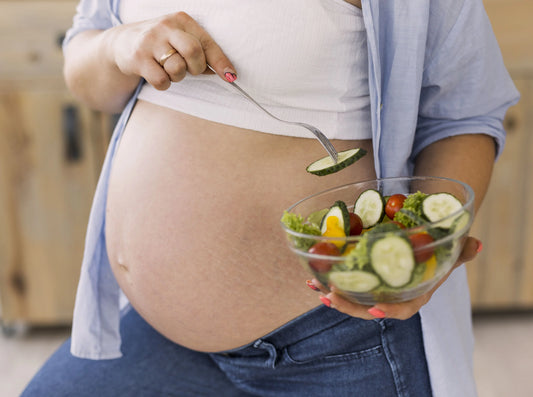Pregnancy or the postpartum period can be a wonderful time, but also a challenging one - especially when it comes to nutrition. During these phases, women need a balanced diet to provide their bodies and their babies with the nutrients they need. But at the same time, the body can also develop unfamiliar hunger pangs that can make it difficult to stick to a healthy diet.
So how can you regulate hunger pangs in a healthy way during pregnancy or breastfeeding? In this article, we will share some useful tips that can help expectant and new mothers maintain a balanced diet without letting hunger pangs overwhelm them.
Hunger during pregnancy
During pregnancy, the body can go through many changes that can lead to increased feelings of hunger. Especially during the first and third trimesters, appetite can be unusually large. One reason for this is that the body needs more energy during this time to support the growing baby.
In addition, the hormone ghrelin, which stimulates appetite, may also be increased during pregnancy. So if you experience frequent hunger pangs during your pregnancy, it's perfectly normal. However, it is important to realize that your body does not necessarily need more calories during this time, but above all a balanced diet with all the important nutrients.
Important nutrients during pregnancy
During pregnancy, a woman's body needs a variety of nutrients to nourish the growing baby and keep it healthy. The most important nutrients during this time include:
Folic acid: Folic acid is important for neural tube development in the embryo and may reduce the risk of neural tube defects such as spina bifida. Pregnant women should therefore consume at least 400 micrograms of folic acid per day.
Iron: Iron is important for the formation of red blood cells, which carry oxygen. During pregnancy, a woman's body needs more iron than usual to nourish the growing baby. Iron-rich foods such as red meat, legumes and spinach can help meet the need.
Calcium: Calcium is important for the formation of bones and teeth in the baby. Pregnant women should therefore consume at least 1,000 milligrams of calcium per day. Dairy products, green vegetables and nuts are good sources of calcium.
Omega-3 fatty acids: Omega-3 fatty acids are important for the development of the baby's brain and eyes. Pregnant women should therefore eat fatty fish such as salmon or tuna at least twice a week to get enough omega-3 fatty acids.
A balanced diet with all the important nutrients is therefore particularly important during pregnancy to support the baby's growth and development.
Hunger during breastfeeding
During breastfeeding, it can be difficult for many women to control their hunger. This is partly because the body needs more energy during this time to produce breast milk. Again, it's important to make sure you eat a balanced diet to meet your nutritional needs. So hunger during breastfeeding is normal and does not necessarily mean that your diet is not adequate.
If you find yourself hungry frequently while breastfeeding, it's important to have healthy snacks on hand that will fill you up while providing nutrients. Fruits, vegetables, nuts and whole grains are good options. Be sure to drink enough water to keep your body hydrated and maintain milk production. If you feel that your hunger is still out of control, talk to your doctor or a lactation consultant.
There are several reasons for excessive hunger during breastfeeding, including hormonal changes, sleep deprivation and stress. In some cases, adjustments to your diet or breastfeeding schedule may be needed to help regulate hunger and keep your body healthy.
Why can it be hard to regulate hunger?
It is not uncommon to have difficulty regulating hunger during pregnancy or breastfeeding. There are several factors that can contribute to feeling hungrier than usual during this time.
One important factor is the hormonal influence on the body. During pregnancy, the body produces more hormones such as progesterone and estrogen, which stimulate the appetite and can cause you to eat more than usual. During breastfeeding, the body produces hormones such as prolactin, which also stimulate appetite and cause the body to burn more calories.
Another factor is the body's increased energy needs during these times. During pregnancy, the body needs to provide enough energy to support the growing baby, while during breastfeeding it needs energy to produce breast milk. When the body feels that it is not getting enough energy, it may increase feelings of hunger to meet the need.
Lack of sleep and stress can also cause the body to need more food to meet energy needs. Being tired or stressed can make the body feel like it needs more energy to deal with the challenges of the day.
Overall, there are many factors that can contribute to the difficulty of regulating hunger during pregnancy or breastfeeding. It's important to make sure you eat a balanced diet and have healthy snacks on hand to provide your body with the nutrients it needs. If hunger is still difficult to control, it may be helpful to talk to a doctor or lactation consultant to discuss possible solutions.
However, losing weight quickly during pregnancy or while breastfeeding is not recommended under any circumstances, as this can be harmful to both mother and baby. Instead, the focus should be on a long-term healthy diet and regular exercise to achieve and maintain a healthy weight.
Conclusion
In summary, it is important to eat a balanced diet and listen to your body's needs during pregnancy and breastfeeding. While it may be normal to feel more hungry than usual during this time, there are many ways to prepare healthy snacks and meals to provide the body with the nutrients it needs.
It is also important to take time to relax and get enough sleep to help the body recover and have the energy it needs. If you have questions or concerns during pregnancy or breastfeeding, talk to your doctor or a lactation consultant for support and advice.
Bio:
Dominik Dotzauer, MD, is a doctor and private health consultant. His work is purely evidence-based and free of esotericism - that means based on current studies and facts. That is why he does not recommend any particular diet or nutritional form as "the only way", but shows his own path.






